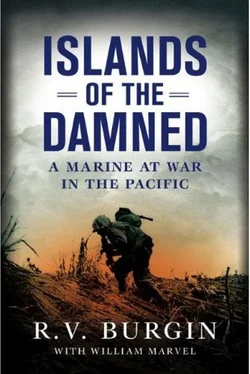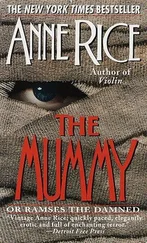It made me dizzy and sick. We’d heard the stories. On New Britain Japs had tied Marines to trees and used them for bayonet practice. So I never had felt any regrets about killing a Jap in combat. Never remorse about any of it. But after the sight of those mutilated bodies, I guessed I’d hate Japs as long as I lived.
* * *
While we were throwing ourselves against the Five Sisters, the Seventh Marines walked into a slaughter north of Walt Ridge that cut them up so badly they were pulled out. The regiment had lost 46 percent of its fighting strength and was in no condition to carry on. Trucks picked up the survivors and drove them back to the Purple Beach rest area. The First Marines had already pulled out for Pavuvu with over 70 percent losses. That left us. Peleliu had cost us 36 percent of our men, wounded and killed. But we were the only Marines General Rupertus had left.
Our commander, Colonel Harold “Bucky” Harris, had a well-known philosophy. Expend ammunition, not men. He had been rethinking the whole campaign against the Pocket. Whatever happened next, it wouldn’t be another headlong rush. Under Colonel Harris, the Fifth would move slowly and deliberately, reducing the Pocket ridge by ridge and cave by cave. Foot by foot if necessary.
On October 6 Third Battalion was pulled back from the Five Sisters. At nine o’clock the next morning we went into the Horseshoe behind Army tanks. Twice that day we pounded the lower slopes of Walt Ridge and the Five Brothers. Midmorning, when the tanks ran out of ammo, we withdrew to refuel and rearm. Then we went back in, this time taking demolition teams and amtracs with flamethrowers. We went on until early afternoon, when the tanks ran out of ammo again. Then we pulled out and were sent south for a rest.
About this time a three-day typhoon swept over Peleliu. The temperatures fell into the eighties, which was a blessing. But it turned the coral dust into gumbo. The mud clogged our equipment and everything bogged down. Supplies couldn’t get in over the raging surf. Streams of Curtiss Commando cargo planes from Guam air-dropped essentials. After the storm passed temperatures shot up over a hundred again and the mud turned back into dust. Things were as they had been.
On October 10, K Company was pulled out of reserves and sent to clean out a nest of snipers who had been firing down on the west road. We were well behind the front lines, in territory that was supposed to be secure. But once again the Japs had hunkered down and waited. A week before, at a spot along the road called Dead Man’s Curve, they had fired on an Army convoy and brought it to a stop. Everyone bailed out and ran for cover, ducking down behind trucks or diving behind rocks at the side of the road. Colonel Joseph Hankins, commander of First Division’s Headquarters Company, had come along in his jeep to check on reports of snipers. When the convoy stopped, Colonel Hankins got out and walked forward to see what was holding things up. Just as everyone yelled at him to get down, he was hit in the chest. He died lying there in the roadway, the highest-ranking Marine killed on Peleliu.
We had a couple Army tanks along with us this time to provide cover. We were taking rifle and mortar fire from several places along a cliff, but we couldn’t see where it was coming from. Hillbilly Jones’s rifle squad was just up the road, and as the morning dragged on a couple of his men were hit, and one of them was killed. Hillbilly decided to try to get a better view of the shooters from one of the tanks. I was about 150 feet away directing mortar fire and I didn’t see everything that happened. But after discussing the situation briefly with a staff officer from battalion headquarters, Hillbilly climbed onto the back of the tank and scrambled forward to slap the side of the turret to alert the gunner what he was up to. He was just peeking around the turret when a single shot hit him in the side and knocked him down. He rolled off the tank into the road, and the call went out for a corpsman. While we watched, Hillbilly picked himself up, bleeding from the side, and pulled himself back onto the tank. Then he stood up. The next shot caught him in the chest and knocked him flat again. This time he didn’t move.
Word spread down the line—Hillbilly’s been hit. By the time I got to the tank, stretcher bearers had carried away the body. All the memories came flooding back. Hillbilly carrying his guitar down to our tents on Pavuvu. Lazy days singing and cracking jokes on the deck of a troopship. Guard duty drinking grapefruit juice and alcohol, and afterward the hangover, on Banika.
For the rest of the day and into the next we blasted away with machine guns, mortars, and rifle fire at every crack or opening we could find along the west road. We took plenty of fire in return, until eventually it tapered off. Not once during that time did we see a single live Jap.
The day after Hillbilly was killed, Second Battalion made it south all the way to the foot of Hill 140, at the head of the Horseshoe. By midafternoon they had taken it, and after that they held it against a sharp counterattack. The battalion had fought its way in from the east road past Baldy, where the Seventh Marines had been beaten so badly. This time bulldozers smoothed the way, clearing a path for flame-throwing amtracs and sealing caves as they advanced.
Command viewed Hill 140 as the key to the whole operation. Its west side fell away sharply to the floor of the Horseshoe. The top looked down on four of the Five Brothers, just to the south. K Company’s mortars were rushed back along the west road and let out at a place where we could proceed on foot to Hill 140. There we would rejoin the rest of Third Battalion, which was on its way to relieve the Second Battalion early the next day. First Battalion had already gone into reserve. That left us the last Marine battalion fighting on Peleliu.
The death of Hillbilly Jones had been a blow. Soon we would absorb another.
Command’s idea had been to plant a 75mm pack howitzer on the top of the hill. But the crest was too sharp and narrow for a gun emplacement, and soon both gun and crew had been dislodged by Japanese fire.
When the Third Battalion arrived, Second Battalion was taking fire from three sides. Where the hill dropped into the Horseshoe, there was no protecting flank. In effect, they held the hill on just three sides. The other was exposed. Orders for Third Battalion were to secure the south side and take the bend out of the line.
In the morning they started working their way up the hill to where Second Battalion was dug in just short of the crest. Everybody was warning them not to show their heads over the top. Jap snipers on the far side were alert, and deadly. But someone needed to see what was beyond the hill in order to direct the battalion’s fire.
Captain Haldane, Johnny Marmet, Sergeant Jim McEnery and a couple other NCOs had made their way to the top and were flat on their bellies trying to figure out how to get a look at the other side. Second Battalion’s own machine gunners were dug in so low, they could hardly see what they were shooting at. They had to sight their guns by looking under the barrels.
This was not satisfactory to Captain Haldane, who was himself an old machine gunner. He slithered forward a few feet and cautiously raised his head.
Everybody heard a sharp thwack and knew instantly what it meant. Those who were close enough said his head just exploded. There was no point in even calling for a corpsman.
We had just arrived at the foot of the hill, looking for our new positions, when Sergeant Marmet came stumbling down the slope, a Thompson submachine gun dangling from his hand by the strap. I knew the moment I saw his face something had happened.
“Hey, Johnny,” I said. “What’s going on?”
Читать дальше











